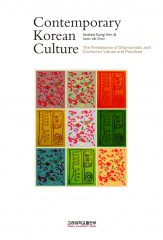Contemporary Korean Culture: The Persistance of Shamanistic and Confucian Values and Practices
ISBN-13: 978-89-7641-874-6
Hardcover: 284 pages
Purchase : amaz.com 교보문고 인터파크 알라딘 예스24
Who are Koreans? What is their character? What are the ideals and aspirations of Koreans that make them behave in certain ways? What are their dominant concerns and interests, their worldviews that best express their underlying beliefs and attitudes? These are not questions concerned with a moral issue of how Koreans should or must live. Instead, these questions are about what matters the most to Koreans, their emotional security, their families and communities, their uncertainties and fears, and their hopes in regard to the larger society. Answers to these questions are systematically and analytically discussed in this book. In particular, the book examines the salient aspects of Korean religio-cultural tradition, specifically shamanism and Confucianism, that have left a lasting impression on both the mental landscape and attitude of contemporary Koreans. There is one compelling and obvious reason for examining Korean religious tradition as a point of departure. As the most important repository of Korean culture, these religions and their values continue to exert overwhelming influence on the thought and bahavior of Koreans as well as on their newly acquired modern ways.
about author
Andrew Eungi Kim (Ph.D in Sociology, University of Toronto) is Professor in the Division of International Studies at Korea University. His primary research interests broadly pertain to culture, sociology of religion, ethnic studies, social change, and comparative sociology. His articles have appeared in Social Indicators Research, Ethnic and Racial Studies, Asian Survey, Journal of Contemporary Asia, Social Compass, Korea Observer, Sociology of Religion, Social History, Review of Religious Research, and Korea Journal, among others. He is presently completing work on a book manuscript which examines the impact of rapid industrialization, modernization and globalization on the shaping of contemporary Korean society.
Joon-sik Choi (Ph.D. in Religion, Temple University) is Professor in the Department of Korean Studies at the Graduate School of International Studies, Ewha Women s University. His research interests include religion, social culture, history and art. He has published extensively on various aspects of Korean religion and culture, including Do Koreans Have a Culture? (2003); Buddhism: Korea s Religion (2007); Spirit of Korean Cultural Roots: Folk Religion (2009); Shamanism: A Central Religion of Koreans Pushed Aside by the Powerful (2009); and Introduction to Death (2013).
